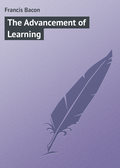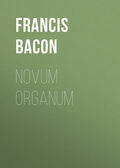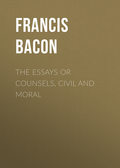
Фрэнсис Бэкон
The New Atlantis
We answered, after we had looked awhile one upon another, admiring this gracious and parent-like usage; "That we could not tell what to say: for we wanted words to express our thanks; and his noble free offers left us nothing to ask. It seemed to us, that we had before us a picture of our salvation in Heaven; for we that were a while since in the jaws of death, were now brought into a place, where we found nothing but consolations. For the commandment laid upon us, we would not fail to obey it, though it was impossible but our hearts should be enflamed to tread further upon this happy and holy ground." We added, "That our tongues should first cleave to the roofs of our mouths, ere we should forget, either his reverend person, or this whole nation, in our prayers." We also most humbly besought him, to accept of us as his true servants; by as just a right as ever men on earth were bounden; laying and presenting, both our persons, and all we had, at his feet. He said; "He was a priest, and looked for a priest's reward; which was our brotherly love, and the good of our souls and bodies." So he went from us, not without tears of tenderness in his eyes; and left us also confused with joy and kindness, saying amongst ourselves; "That we were come into a land of angels, which did appear to us daily, and prevent us with comforts, which we thought not of, much less expected."
The next day about ten of the clock, the Governor came to us again, and after salutations, said familiarly; "That he was come to visit us;" and called for a chair, and sat him down: and we, being some ten of us, (the rest were of the meaner sort, or else gone abroad,) sat down with him, And when we were set, he began thus: "We of this island of Bensalem," (for so they call it in their language,) "have this; that by means of our solitary situation; and of the laws of secrecy, which we have for our travellers, and our rare admission of strangers; we know well most part of the habitable world, and are ourselves unknown. Therefore because he that knoweth least is fittest to ask questions, it is more reason, for the entertainment of the time, that ye ask me questions, than that I ask you."
We answered; "That we humbly thanked him that he would give us leave so to do: and that we conceived by the taste we had already, that there was no worldly thing on earth, more worthy to be known than the state of that happy land. But above all," (we said,) "since that we were met from the several ends of the world, and hoped assuredly that we should meet one day in the kingdom of Heaven, (for that we were both parts Christians,) we desired to know, (in respect that land was so remote, and so divided by vast and unknown seas, from the land where our Saviour walked on earth,) who was the apostle of that nation, and how it was converted to the faith?" It appeared in his face that he took great contentment in this our question: he said; "Ye knit my heart to you, by asking this question in the first place; for it sheweth that you first seek the kingdom of heaven; and I shall gladly, and briefly, satisfy your demand.
"About twenty years after the ascension of our Saviour, it came to pass, that there was seen by the people of Renfusa, (a city upon the eastern coast of our island,) within night, (the night was cloudy, and calm,) as it might be some mile into the sea, a great pillar of light; not sharp, but in form of a column, or cylinder, rising from the sea a great way up towards heaven; and on the top of it was seen a large cross of light, more bright and resplendent than the body of the pillar. Upon which so strange a spectacle, the people of the city gathered apace together upon the sands, to wonder; and so after put themselves into a number of small boats, to go nearer to this marvellous sight. But when the boats were come within (about) sixty yards of the pillar, they found themselves all bound, and could go no further; yet so as they might move to go about, but might not approach nearer: so as the boats stood all as in a theatre, beholding this light as an heavenly sign. It so fell out, that there was in one of the boats one of the wise men, of the society of Salomon's House; which house, or college (my good brethren) is the very eye of this kingdom; who having awhile attentively and devoutly viewed and contemplated this pillar and cross, fell down upon his face; and then raised himself upon his knees, and lifting up his hands to heaven, made his prayers in this manner.
"'LORD God of heaven and earth, thou hast vouchsafed of thy grace to those of our order, to know thy works of Creation, and the secrets of them: and to discern (as far as appertaineth to the generations of men) between divine miracles, works of nature, works of art, and impostures and illusions of all sorts. I do here acknowledge and testify before this people, that the thing which we now see before our eyes is thy Finger and a true Miracle. And forasmuch as we learn in our books that thou never workest miracles, but to divine and excellent end, (for the laws of nature are thine own laws, and thou exceedest them not but upon great cause,) we most humbly beseech thee to prosper this great sign, and to give us the interpretation and use of it in mercy; which thou dost in some part secretly promise by sending it unto us.'
"When he had made his prayer, he presently found the boat he was in, moveable and unbound; whereas all the rest remained still fast; and taking that for an assurance of leave to approach, he caused the boat to be softly and with silence rowed towards the pillar. But ere he came near it, the pillar and cross of light brake up, and cast itself abroad, as it were, into a firmament of many stars; which also vanished soon after, and there was nothing left to be seen, but a small ark, or chest of cedar, dry, and not wet at all with water, though it swam. And in the fore-end of it, which was towards him, grew a small green branch of palm; and when the wise man had taken it, with all reverence, into his boat, it opened of itself, and there were found in it a Book and a Letter; both written in fine parchment, and wrapped in sindons of linen. The Book contained all the canonical books of the Old and New Testament, according as you have them; (for we know well what the churches with you receive); and the Apocalypse itself, and some other books of the New Testament, which were not at that time written, were nevertheless in the Book. And for the Letter, it was in these words:
"'I, Bartholomew, a servant of the Highest, and Apostle of Jesus Christ, was warned by an angel that appeareth to me, in a vision of glory, that I should commit this ark to the floods of the sea. Therefore I do testify and declare unto that people where God shall ordain this ark to come to land, that in the same day is come unto them salvation and peace and good-will, from the Father, and from the Lord Jesus.'
"There was also in both these writings, as well the Book, as the Letter, wrought a great miracle, conform to that of the Apostles, in the original Gift of Tongues. For there being at that time in this land Hebrews, Persians, and Indians, besides the natives, every one read upon the Book, and Letter, as if they had been written in his own language. And thus was this land saved from infidelity (as the remainder of the old world was from water) by an ark, through the apostolical and miraculous evangelism of Saint Bartholomew." And here he paused, and a messenger came, and called him from us. So this was all that passed in that conference.
The next day, the same governor came again to us, immediately after dinner, and excused himself, saying; "That the day before he was called from us, somewhat abruptly, but now he would make us amends, and spend time with us if we held his company and conference agreeable." We answered, "That we held it so agreeable and pleasing to us, as we forgot both dangers past and fears to come, for the time we hear him speak; and that we thought an hour spent with him, was worth years of our former life." He bowed himself a little to us, and after we were set again, he said; "Well, the questions are on your part."
One of our number said, after a little pause; that there was a matter, we were no less desirous to know, than fearful to ask, lest we might presume too far. But encouraged by his rare humanity towards us, (that could scarce think ourselves strangers, being his vowed and professed servants,) we would take the hardiness to propound it: humbly beseeching him, if he thought it not fit to be answered, that he would pardon it, though he rejected it. We said; "We well observed those his words, which he formerly spake, that this happy island, where we now stood, was known to few, and yet knew most of the nations of the world; which we found to be true, considering they had the languages of Europe, and knew much of our state and business; and yet we in Europe, (notwithstanding all the remote discoveries and navigations of this last age), never heard of the least inkling or glimpse of this island. This we found wonderful strange; for that all nations have inter-knowledge one of another, either by voyage into foreign parts, or by strangers that come to them: and though the traveller into a foreign country, doth commonly know more by the eye, than he that stayeth at home can by relation of the traveller; yet both ways suffice to make a mutual knowledge, in some degree, on both parts. But for this island, we never heard tell of any ship of theirs that had been seen to arrive upon any shore of Europe; nor of either the East or West Indies; nor yet of any ship of any other part of the world, that had made return from them. And yet the marvel rested not in this. For the situation of it (as his lordship said) in the secret conclave' of such a vast sea might cause it. But then, that they should have knowledge of the languages, books, affairs, of those that lie such a distance from them, it was a thing we could not tell what to make of; for that it seemed to us a conditioner and propriety of divine powers and beings, to be hidden and unseen to others, and yet to have others open and as in a light to them."
At this speech the Governor gave a gracious smile, and said; "That we did well to ask pardon for this question we now asked: for that it imported, as if we thought this land, a land of magicians, that sent forth spirits of the air into all parts, to bring them news and intelligence of other countries." It was answered by us all, in all possible humbleness, but yet with a countenance taking knowledge, that we knew that he spake it but merrily, "That we were apt enough to think there was somewhat supernatural in this island; but yet rather as angelical than magical. But to let his lordship know truly what it was that made us tender and doubtful to ask this question, it was not any such conceit, but because we remembered, he had given a touch in his former speech, that this land had laws of secrecy touching strangers." To this he said; "You remember it aright and therefore in that I shall say to you, I must reserve some particulars, which it is not lawful for me to reveal; but there will be enough left, to give you satisfaction."
"You shall understand (that which perhaps you will scarce think credible) that about three thousand years ago, or somewhat more, the navigation of the world, (especially for remote voyages,) was greater than at this day. Do not think with yourselves, that I know not how much it is increased with you, within these six-score years: I know it well: and yet I say greater then than now; whether it was, that the example of the ark, that saved the remnant of men from the universal deluge, gave men confidence to adventure upon the waters; or what it was; but such is the truth. The Phoenicians, and especially the Tyrians, had great fleets. So had the Carthaginians their colony, which is yet further west. Toward the east the shipping of Egypt and of Palestine was likewise great. China also, and the great Atlantis, (that you call America,) which have now but junks and canoes, abounded then in tall ships. This island, (as appeareth by faithful registers of those times,) had then fifteen hundred strong ships, of great content. Of all this, there is with you sparing memory, or none; but we have large knowledge thereof.
"At that time, this land was known and frequented by the ships and vessels of all the nations before named. And (as it cometh to pass) they had many times men of other countries, that were no sailors, that came with them; as Persians, Chaldeans, Arabians; so as almost all nations of might and fame resorted hither; of whom we have some stirps, and little tribes with us at this day. And for our own ships, they went sundry voyages, as well to your straits, which you call the Pillars of Hercules, as to other parts in the Atlantic and Mediterrane Seas; as to Paguin, (which is the same with Cambaline,) and Quinzy, upon the Oriental Seas, as far as to the borders of the East Tartary.
"At the same time, and an age after, or more, the inhabitants of the great Atlantis did flourish. For though the narration and description, which is made by a great man with you; that the descendants of Neptune planted there; and of the magnificent temple, palace, city, and hill; and the manifold streams of goodly navigable rivers, (which as so many chains environed the same site and temple); and the several degrees of ascent, whereby men did climb up to the same, as if it had been a scala coeli, be all poetical and fabulous: yet so much is true, that the said country of Atlantis, as well that of Peru, then called Coya, as that of Mexico, then named Tyrambel, were mighty and proud kingdoms in arms, shipping and riches: so mighty, as at one time (or at least within the space of ten years) they both made two great expeditions; they of Tyrambel through the Atlantic to the Mediterrane Sea; and they of Coya through the South Sea upon this our island: and for the former of these, which was into Europe, the same author amongst you (as it seemeth) had some relation from the Egyptian priest whom he cited. For assuredly such a thing there was. But whether it were the ancient Athenians that had the glory of the repulse and resistance of those forces, I can say nothing: but certain it is, there never came back either ship or man from that voyage. Neither had the other voyage of those of Coya upon us had better fortune, if they had not met with enemies of greater clemency. For the king of this island, (by name Altabin,) a wise man and a great warrior, knowing well both his own strength and that of his enemies, handled the matter so, as he cut off their land-forces from their ships; and entoiled both their navy and their tamp with a greater power than theirs, both by sea and land: arid compelled them to render themselves without striking stroke and after they were at his mercy, contenting himself only with their oath that they should no more bear arms against him, dismissed them all in safety.
"But the divine revenge overtook not long after those proud enterprises. For within less than the space of one hundred years, the great Atlantis was utterly lost and destroyed: not by a great earthquake, as your man saith; (for that whole tract is little subject to earthquakes;) but by a particular' deluge or inundation; those countries having, at this day, far greater rivers and far higher mountains to pour down waters, than any part of the old world. But it is true that the same inundation was not deep; not past forty foot, in most places, from the ground; so that although it destroyed man and beast generally, yet some few wild inhabitants of the wood escaped. Birds also were saved by flying to the high trees and woods. For as for men, although they had buildings in many places, higher than the depth of the water, yet that inundation, though it were shallow, had a long continuance; whereby they of the vale that were not drowned, perished for want of food and other things necessary.







